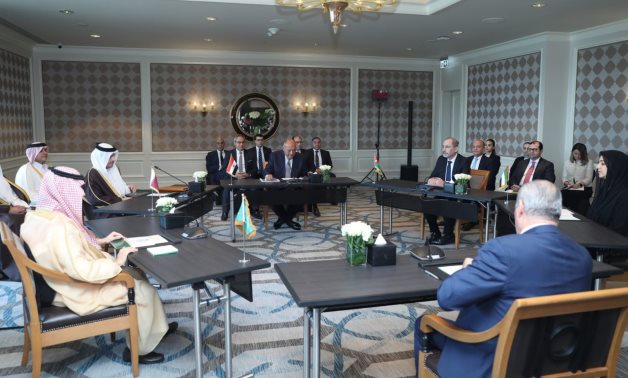
FMs of Egypt, Saudi Arabia, Qatar and Jordan, UAE Minister of State for International Cooperation, and Secretary General of the Executive Committee of the Palestine Liberation Organization meet in Cairo
CAIRO – 21 March 2024: Ministers from Egypt, Saudi Arabia, Jordan, Qatar, and the United Arab Emirates have jointly called for the opening of all border crossings between Israel and the Gaza Strip to allow for the delivery of humanitarian assistance.
While Gaza and Israel share six border crossings, including the well-known Erez crossing, most of them are currently not operational for humanitarian purposes.
Presently, aid to Gaza is primarily delivered through the Rafah border crossing between Egypt and Gaza, as well as the Kerem Abu Salem crossing, which falls under Israeli control.
Slow Israeli inspection procedures and restrictions have caused significant delays and hindered the timely delivery of aid, exacerbating the severe food shortage in the Gaza Strip.
The United Nations has issued warnings that a quarter of the 2.3 million population in Gaza is on the verge of famine.
The foreign ministers of Egypt, Saudi Arabia, Qatar, and Jordan, along with the UAE Minister of State for International Cooperation, convened in Cairo on Thursday alongside the Secretary General of the Executive Committee of the Palestine Liberation Organization.
The meeting coincided with the visit of United States Secretary of State Antony Blinken to Cairo, where he held discussions with Egypt's President Abdel Fattah El-Sisi and Foreign Minister Sameh Shoukry.
Local reports indicate that the Arab officials will meet with Secretary Blinken in the Egyptian capital to discuss the situation in Gaza.
During their meeting, the Arab officials stressed the urgent need to achieve a comprehensive and immediate ceasefire, as well as to enhance access to humanitarian aid, a joint statement said.
They called for the removal of all barriers imposed by Israel that obstruct the full implementation of UN Security Council Resolution 2720, in order to address the dire needs of over two million Palestinians facing famine in Gaza.
The Arab officials reasserted their rejection of any attempts to displace Palestinians from their lands and eliminate the Palestinian cause.
They called for providing full support to the United Nations Relief and Works Agency for Palestine Refugees in the Near East (UNRWA).
The officials emphasized the importance of Israel refraining from unilateral actions that undermine the prospects of a just peace, including settlements and other activities that seek to alter the historical and legal status of Jerusalem, along with its Islamic and Christian holy sites.
They underscored the significant role of the Hashemite custodianship in safeguarding these sacred sites and preserving their Arab, Islamic, and Christian identity.
Furthermore, the officials reiterated the necessity of implementing the two-state solution and establishing a Palestinian state in accordance with international resolutions and the Arab Peace Initiative.
The war in Gaza has persisted for more than five months with Israeli attacks killing around 32,000 people, damaging or destroying most of Gaza’s infrastructure, and worsening the hunger crisis in Gaza.
Indirect ceasefire negotiations are currently underway between Hamas and Israel, facilitated by mediators from Egypt, Qatar, and the United States, with the aim of ending the conflict in Gaza for a period of at least six weeks.
Numerous nations, particularly Egypt, are deeply concerned about Israeli plans for a ground invasion of Rafah, a city in southern Gaza that is currently home to nearly 1.5 million Palestinians, up from around 200,000 before the war.
Rafah city lies on the Egypt-Gaza border.
Last week, Israeli Prime Minister Benjamin Netanyahu gave his approval for a potential ground invasion in Rafah, which includes evacuation of the population.
Comments
Leave a Comment